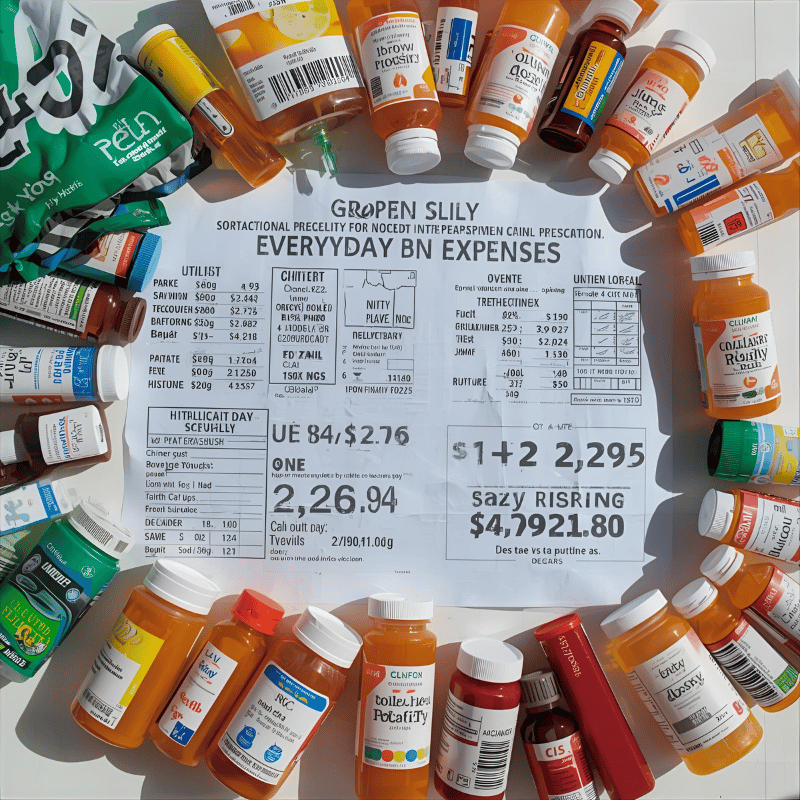If you’ve noticed your grocery bill creeping higher, utility costs going up, or everyday basics costing more than ever, you’re not imagining it. Rising prices have hit people over 50 especially hard. Many are living on fixed or semi-fixed incomes, managing medical expenses, or trying to stretch savings longer than planned. The financial pressure is real, and stressful.
But here’s the good news! You don’t need to overhaul your entire life or make extreme sacrifices to get relief. Small changes in the right places can immediately reduce your monthly expenses and help you feel more in control, even during unpredictable economic times.
This guide explains why costs are rising, how it impacts people over 50, and seven simple ways you can start reducing expenses right away.

Why Rising Prices Are Hitting People Over 50 the Hardest

People in their 50s and 60s are facing unique financial challenges that younger adults don’t typically experience. Some of the biggest factors include:
Limited income growth
Most people over 50 are in semi-retirement, retirement, or working fewer hours by choice. Income isn’t increasing while expenses are.
Higher healthcare needs
Medical care, prescriptions, and insurance premiums increase as we age — and they rise faster than inflation.
Support for adult children or aging parents
Many people in midlife are financially supporting both generations, adding pressure to an already stretched budget.
Fixed or shrinking savings
Rising prices can drain savings faster, making long-term planning feel uncertain.
The result: even responsible, financially smart adults are feeling squeezed. But there are practical ways to fight back.

How Rising Costs Are Showing Up in Everyday Life

These are the areas where people over 50 are seeing the biggest increases:
Groceries
Staples like eggs, bread, meat, and produce continue rising, and portions are shrinking.
Utilities
Electricity, natural gas, and water rates are increasing in many regions.
Insurance premiums
Home, auto, and especially health insurance costs are climbing.
Medications
Prescription co-pays and out-of-pocket costs have increased year over year.
Transportation
Fuel costs, maintenance, and car insurance are all rising.
Even though none of this is your fault, it affects your daily life. That’s why simplifying and reducing expenses is more important than ever. Not to restrict your life, but to protect it.
7 Simple Ways to Reduce Monthly Expenses Immediately After 50
1. Audit Your Expenses for “Quiet Drainers”

Quiet drainers are the small costs that slip through unnoticed. The subscription renewals, duplicate services, automatic charges, unused memberships, and convenience apps.
Do a quick review of your last two months of bank or credit card statements. Look for:
- Streaming apps you don’t use
- Duplicate antivirus or cloud storage
- Magazine or software renewals
- Unused gym or online memberships
Cutting even three or four can free $40–$100 a month instantly.

2. Simplify Your Phone, Internet, and Cable Plans

Telecom companies quietly raise rates every year. Many people over 50 are overpaying by $50–$150 a month. Negotiation tips:
- Call your provider and ask for “promotional pricing.”
- Tell them you’re considering switching if they can’t match competitor rates.
- Cancel cable and use free streaming apps or a couple of low-cost options.
Most people save between $300 and $1,200 a year with one phone call.
3. Reduce Grocery Expenses Without Cutting Quality

Food prices may be rising, but there are simple ways to keep your budget steady:
- Plan meals around weekly sales
- Buy generics for basics
- Use store loyalty programs
- Batch-cook a few meals per week
- Shop produce in season
- Avoid impulse buys
Also, switching from brand-name to store-brand for even 10 items can save $25+ per trip.

4. Ask for Better Insurance Rates (This Works More Than You Think)

Insurance companies rely on people staying loyal and not comparing prices. A quick annual review can save hundreds.
Shop around for auto, home, and Medicare supplements. Ask about:
- Bundling discounts
- Low-mileage auto policies
- Safe-driver rewards
- Defensive driving course discounts
This is one of the fastest ways to reduce monthly expenses for adults over 50.
5. Cut Utility Costs with a Few Simple Adjustments

Small changes add up quickly:
- Turn the thermostat down 2 degrees in winter or up 2 degrees in summer
- Replace old bulbs with LEDs
- Unplug devices when not in use
- Use smart plugs or power strips
- Wash clothes in cold water
- Check windows and doors for minor leaks
Many people save $20–$60 a month without sacrificing comfort.

6. Reassess Recurring Medical and Health Expenses

Healthcare is one of the most unpredictable costs for people over 50. But reviewing your plans and routines can help.
Check for:
- Generic medication alternatives
- Discount prescription programs
- Pharmacies with lower prices
- Insurance plan changes during open enrollment
- Unused health or wellness memberships
A few adjustments can lower medical spending without compromising your care.
7. Simplify Your Lifestyle to Reduce Daily Costs

Instead of living with stress, simplify strategically:
- Declutter and sell unused items
- Cook at home more often
- Plan errands efficiently to save fuel
- Use free community resources
- Reduce impulse spending
- Choose activities that enrich life without added cost
Simple living isn’t about doing less, it’s about spending more time on what matters most.

The Real Benefit: Peace of Mind
Reducing expenses after 50 isn’t just about saving money. It’s about reducing stress, increasing stability, and giving yourself the freedom to enjoy life without financial tension.
When your monthly costs are manageable, everything else feels easier – work, health, relationships, and day-to-day decisions.
Final Thoughts
Rising prices are a real challenge, but they don’t have to control your life. A few small changes can create meaningful breathing room in your budget, even in uncertain times.
Start with one or two steps from this list and build gradually. Over weeks and months, you’ll feel lighter, more confident, and more in control of your financial future.



